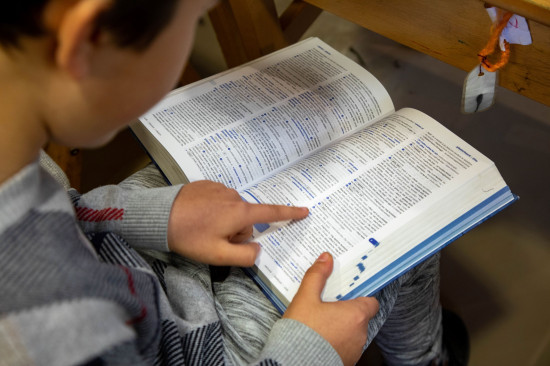Academic Research
Please find below a list of academic articles relating to aspects of Waldorf Education.
Please note that this list is not exhaustive and will be updated.
Title: Steiner Waldorf: Distance Travelled - An evaluative review of progress from 2018-2024 & Executive Summary - Distance Travelled
Authors: Dr Carla Solvason, Dr Angela Hodgkins, Samantha Sutton-Tsang, University of Worcester
Publication Date: 2025
Title: The Humane Education of Waldorf
Author: Kate Attfield
Publication Date: 2024
Title: Outdoor learning in early childhood education: exploring benefits and challenge
Authors: Kiviranta, L., Lindfors, E., Rönkkö, M.-L., & Luukka, E.
Publication Date: 2024
Title: The “feeling-life” journey of the grade school child: An investigation into inclusive young citizenship in international Waldorf education.
Author: Kate Attfield
Publication Date: 2023
Title: Rethinking and Restructuring Waldorf Curricula: An On-Going Approach
Authors: Kath Bransby & Martyn Rawson
Publication Date: 2022
Title: A glossary of terms relating to assessment
Author: Martyn Rawson
Publication Date: June 2021
Title: Learning about relationships, sexuality, gender and identity in Waldorf education: potential problems and possible curriculum solutions
Author: Martyn Rawson
Publication Date: April 2021
Title: Screen Time: a Health and Development Issue
Author: Dr. Aric Sigman
Publication Date: March 2021
Title: The Advantages of a Later Start to Formal Education
Author: Sue Palmer
Publication Date: February 2021
Title: Waldorf Education for the Future: A Framework for Curriculum Practice
Authors: Kath Bransby & Martyn Rawson
Publication Date: February 2021
Title: A Systematic Review Protocol to Identify the Key Benefits and Efficacy of Nature-Based Learning in Outdoor Educational Settings.
Authors: Mann, J., Gray, T., Truong, S., Sahlberg, P., Bentsen, P., Passy, R., Ho, S., Ward, K., & Cowper, R.
Publication Date: 2021
Title: Exploring multiple intelligence theory prospects as a vehicle for discovering the relationship of neuroeducation with imaginative/waldorf pedagogy: A systematic literature review
Authors: Mavrelos, M., & Daradoumis, T.
Publication Date: 2020
Title: Toward media literacy or media addiction? Contours of good governance for healthy childhood in the digital world.
Author: Paula Bleckmann
Publication Date: March 2020
Title: Psychological impacts of “screen time” and “green time” for children and adolescents: A systematic scoping review
Authors: Tassia K. Oswald , Alice R. Rumbold, Sophie G. E. Kedzior, Vivienne M. Moore
Publication Date: 2020
Title: Spiritual moments making music in nature. A study exploring the experiences of children making music outdoors, surrounded by nature.
Authors: Adams, D., & Beauchamp, G.
Publication Date: 2019
Title: Appropriate school starting age: A focus on the cognitive and social development of a child
Author: Mahwish Ali Baber
Publication Date: 2016
Title: Play’s relation to health and well-being in preschool and kindergarten: a Waldorf (Steiner) education perspective. International Journal of Play, 3(1), 9–23.
Author: Sobo, E. J.
Publication Date: 2014
Title: Meeting the child in Steiner kindergartens : an exploration of beliefs, values and practices (1st ed.)
Author: Parker-Rees, Rod
Publication Date: 2014 by Routledge ( Please note that this is a book)
Abstracts: What can early years practitioners learn from Steiner kindergartens? What is distinctive about Steiner kindergarten teachers’ ways of getting to know children?
As demands for accountability in Early Years settings continue to grow, external pressure to assess children and to measure their progress can disrupt the development of informal and intimate relationships between teachers and children.
The contributors to this book, who include both experienced Steiner educators and early childhood experts from other backgrounds, have worked together to explore and understand what is distinctive about Steiner kindergarten practice. They present a variety of perspectives on the ways in which kindergarten teachers’ practices, values and beliefs can help children to find and construct their own identities, through play and through engagement in the life of their community. The authors explore key aspects of Steiner kindergarten practice, including caring for the physical environment, establishing rhythms and routines for children’s activity, and providing times and spaces in which teachers and children can get to know each other. By meeting with children and teachers, through rich accounts of day to day life in kindergartens and through accounts of the values and principles which inform their practice, readers will be encouraged to question and reflect on their own approaches to observation and assessment.
Title: School Starting Age- The Evidence
Authors: University of Cambridge
Publication Date: 2010

